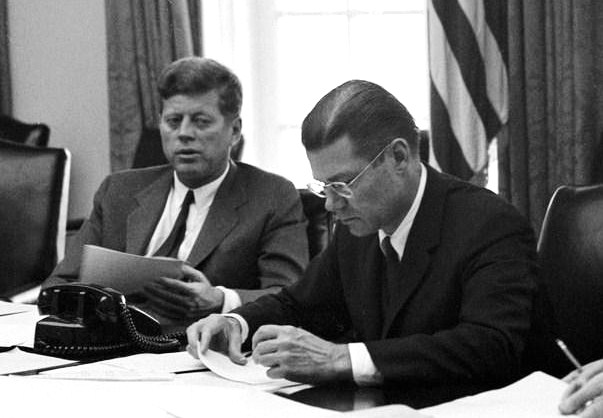 |
| Pres. Kennedy and Sec. McNamara |
If you have any questions about the movie, or would like to put forward some answers to these questions (only one or two at a time, please) feel free to do so in the comments.
- Keep track of the people who are involved in each decision and what their official jobs are.
- What methods did the Kennedys use to go about making a decision?
- What are the different solutions that are put forward in Thirteen Days?
- What are the pros and cons of the different solutions?
- Who supports which options?
- How unified is the administration in developing and choosing solutions?
- Why are some are some members of the administration so worried about world opinion?
- Why is it so important that the surveillance pilots lie about being shot at?
- Why is MacNamara so concerned about the Navy firing “star shells?”
- Which conceptual models (from Allison: Rational Policy; Organizational Process; Bureaucratic Politics) do you think best explains the events of the Cuban Missile Crisis? Why?
- Are there certain episodes in the Cuban Missile Crisis that are better explained by one conceptual model or another? When and why?
The movie is extremely entertaining, and informative. Definitely worth showing! I still have a question, at the end of the movie Mr. Mathewson said that there are some cases where the military can make decisions without the approval of the President, if so, why didn't they act most of the times without the approval of Kennedy? Why were they just waiting for him to give the orders? What are some examples of when the military can act without the approval of the President? Thanks...-Ces Escobedo
ReplyDeleteCes,
DeleteI agree with you primarily, especially about the movie in general. As for the military acting on their own accord, I believe it is because a) the president is the commander in chief and is therefore the head of the military and b) the military did act on their own accord partially. They didn't launch a full out invasion, but they did authorize star-shelling and visible mobilization without Kennedy's permission. Both of these actions could have lead to further hostilities from the Soviet's and were a direct result of the organizational "standard operating procedure" that the army follows dogmatically.
Kennedy is right. The President is Commander in Chief, and when he steps in he has the authority to command. However, the military is flexible enough so that they can operate on their own--within the scope of the law--without the president micromanaging everything.
DeleteMoreover, there is also a norm of civilian military control in the US, where military officers are subordinate to civilian government leaders.
But there are a couple of specific examples where the law says that military actors can act without prior consent of the the Commander in Chief. One example in the movie was when Strategic Air Command raised the defense posture of their nuclear forces from DefCon 3 to DefCon 2, the last step before all-out war. SAC has the power to do that without the president in the event that DC is hit with a sneak attack before Washington can respond.
Hope this explains what was going on.
Whoops, meant to say "John is right," not Kennedy is right.
DeleteThe movie was very informative and interesting. Although, I am surprised the book/movie took Kenny's perspective instead of those of the president. It is different though, but I imagine the president was much more influential in the decisions. The interesting part was to see Kenny's home life and how it affected the average American. My grandparents had just give birth to my father just a month and a half before and they said it was the scariest time in their lives. I would like to see something from the Soviets' perspective, like when at the embassy, the woman was shaking. I think the book would be an interesting read. I am curious if there are any differences as always with book-to-movie showings. One question I would have liked to have been answered though is what happened with the Time magazine publication. I wanted to see how that played out.- Jeremy McMillan
ReplyDeleteI also agree that the movie was extremely interesting and a good dramatic insight into the minds of the people involving in the decision-making. I also had a question. The president was obviously at the top of the hierarchy, but I was wondering what the hierarchy was under him. To put my question in context when Secretary of Defense McNamara was telling the Admiral what to do I was confused if the Admiral was only listening because the president said no air strikes and McNamara was relying the message, or because the Admiral answers to McNamara too.
ReplyDelete-Feddi Roth
The Secretary of Defense is the head of the Department of Defense, which is the civilian department that controls the Army, Navy (including Marines) and Air Force. That means the Admiral was in fact subordinate to the McNamara.
Delete